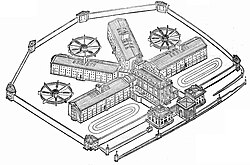Penology
| Criminology and penology |
|---|
 |
Penology (also penal theory) is a subfield of criminology that deals with the philosophy and practice[1][2] of various societies in their attempts to repress criminal activities, and satisfy public opinion via an appropriate treatment regime for persons convicted of criminal offences.
The Oxford English Dictionary defines penology as "the study of the punishment of crime and prison management," and in this sense it is equivalent with corrections.[3] The term penology comes from "penal", Latin poena, "punishment" and the Greek suffix -logia, "study of".
Penology is concerned with the effectiveness of those social processes devised and adopted for the prevention of crime, via the repression or inhibition of criminal intent via the fear of punishment. The study of penology therefore deals with the treatment of prisoners and the subsequent rehabilitation of convicted criminals. It also encompasses aspects of probation (rehabilitation of offenders in the community) as well as penitentiary science relating to the secure detention and retraining of offenders committed to secure institutions.
Penology concerns many topics and theories, including those concerning
History


Historical theories were based on the notion that fearful consequences would discourage potential offenders. An example of this principle can be found in the Draconian law of Ancient Greece and the Bloody Code which persisted in Renaissance England, when (at various times) capital punishment was prescribed for over 200 offenses. Similarly, certain hudud offenses under Sharia hadith tradition may incur fearful penalties.
Modern theories of the punishment and rehabilitation of offenders are broadly based on principles articulated in the seminal pamphlet
Penologists have consequently evolved occupational and psychological education programs for offenders detained in prison, and a range of
More recently, some penologists have shifted from a retributive based punishment to a form of community corrections. "Community corrections involves the management and supervision of offenders in the community. These offenders are serving court-imposed orders either as an alternative to imprisonment or as a condition of their release on parole from prison. This means they must report regularly to their community corrections officer and may have to participate in unpaid community work and rehabilitation programs.[5]"
See also
- Auburn System
- Zebulon Brockway
- Elmira Correctional Facility
- His Majesty's Prison Service
- Offender workforce development
- Panopticon
- Penal transportation
- Prison reform
- Protective Pairing
References
- ISBN 978-81-7156-754-6. Retrieved 2 March 2013.
- ISBN 978-1-4200-5388-3. Retrieved 2 March 2013.
- ISBN 978-0-7914-2174-1.
- ^ Marcello Maestro, "A pioneer for the abolition of capital punishment: Cesare Beccaria." Journal of the History of Ideas 34.3 (1973): 463-468. online
- ^ Corrections Prisons Parole, Department of Justice. "Community corrections". www.corrections.vic.gov.au. Archived from the original on 2019-04-28. Retrieved 2018-10-25.
Further reading
- Diiulio, John J., Governing Prisons: A Comparative Study of Correctional Management, Simon and Schuster, 1990. ISBN 0-02-907883-0
- Feeley, M. M., & Simon, J. (1992). The new penology: Notes on the emerging strategy of corrections and its implications. Criminology, 30(4), 449-474.
- Kazemian, L., McCoy, C., & Sacks, M. (2013). Does law matter? An old bail law confronts the New Penology. Punishment & Society, 15(1), 43-70.
External links
- CrimLinks UK based site
